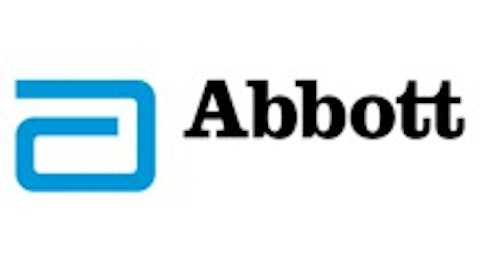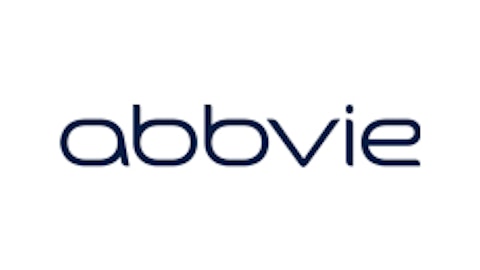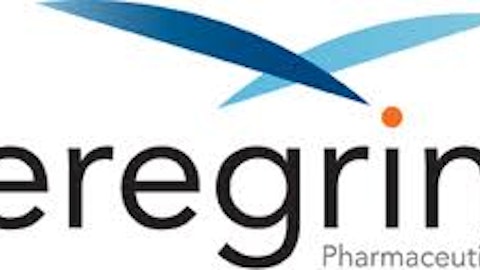Missed it by this much. That’s how it goes some times.
The Motley Fool recently published its list of The 25 Best Companies in America and while Bristol-Myers Squibb Co. (NYSE:BMY)made the initial cut down from 1,700 public companies to about 40, it failed to make the final cut.
For having such a long name and a history that dates back to 1858, Bristol-Myers Squibb is surprisingly smaller than most of its pharmaceutical peers. Quite a few younger big biotechs — Celgene Corporation (NASDAQ:CELG), Gilead Sciences, Inc. (NASDAQ:GILD), and Amgen, Inc. (NASDAQ:AMGN) — have market caps larger than Bristol-Myers.

A few years ago, Bristol-Myers decided to slim down and focus exclusively on drug development. The company spun off its baby formula business, Mead Johnson Nutrition CO (NYSE:MJN), and sold off quite a few other auxiliary businesses while expanding its drug development through acquisitions to fill its pipeline.
That forward-thinking attitude has earned it a nomination for the Fool’s top 25 best-run companies.
The case for Bristol Myers Squibb Co. (NYSE:BMY)
Drug development is risky business, but Bristol-Myers has protected investors by sharing that risk with other drugmakers. Its mega blockbuster Plavix was developed with Sanofi SA (ADR) (NYSE:SNY) . Bristol-Myers’ next potential blockbuster, Eliquis, was developed with Pfizer Inc. (NYSE:PFE). The company has also established a diabetes partnership with AstraZeneca plc (ADR) (NYSE:AZN), which led to the companies jointly purchasing Amylin Pharmaceuticals.
Developing drugs with a partner cuts into the potential profits, but it also shields the company from major hits if the drug fails. When Bristol-Myers has gone it alone, it hasn’t been pretty. The company purchased Inhibitex for $2.5 billion only to see the lead hepatitis C drug it got in the deal fail in the clinic.
Beyond shareholders, Bristol-Meyers treats the rest of the stakeholders with equal respect.
Like most drugmakers, Bristol-Myers has a patient assistance program to help patients pay for their medication. In 2011, the company provided 250,000 patients with free medications valued at more than $450 million.
More generally, Bristol-Myers takes its corporate responsibility seriously. In 2010, it set a series of goals to be completed by 2015, including reducing total energy use and greenhouse gas emissions by 15% and to reduce water use by 10%.
According to reviews on Glassdoor, only 68% of employees would recommend working at Bristol-Myers to a friend, although interestingly 91% approve of CEO Lamberto Andreotti. Many of the reviews complain that it’s difficult to advance in the company. Apparently everyone wants to eventually have Andreotti’s job, but doesn’t feel like that’s possible. Something for the company to work on, for sure.
The case against
The marketing of drugs is supposed to be straightforward. The Food and Drug Administration approves a drug for a specific indication. While doctors are allowed to prescribe drugs off label, drugmakers are expected to limit their promotion to just the FDA-approved use.
In the past, Bristol Myers Squibb Co. (NYSE:BMY) seems to have blurred that line. In 2007, Bristol-Myers agreed to pay more than $515 million to resolve allegations of illegal drug marketing and pricing practices. The Department of Justice accused Bristol-Myers of promoting its antipsychotic Abilify for uses it wasn’t approved for. The company also allegedly gave doctors kickbacks to induce them to prescribe Bristol-Myers’ drugs.
In 2011, the California Insurance Commissioner jumped on a whistleblower bandwagon that claimed the company wooed doctors with everything from golf outings to samba dances to seats in a suite at Lakers basketball games.
Like the rest of the industry, Bristol-Myers has cleaned up its marketing act. A few years ago, drugmakers voluntarily agreed to eliminate all branded freebies, from pens to mugs to T-shirts.
Still, off-label use remains a lucrative way to expand sales that can be hard to regulate. Self-policing — mostly through the potential for whistleblower lawsuits — remains the only way for the industry to play by the rules.
Foolish bottom line
Past indiscretions aside, Bristol-Myers Squibb has proven it can balance all the stakeholders by producing solid returns for investors while respecting patients and employees. Even if it didn’t make the top 25, just missing the cut is still pretty impressive and should be a signal for investors to take a closer look.
Click here to read about the companies that made the final cut of The 25 Best Companies in America.
The article Is Bristol-Myers Squibb One of the Best Companies in America? originally appeared on Fool.com.
Fool contributor Brian Orelli has no position in any stocks mentioned. The Motley Fool recommends Gilead Sciences.
Copyright © 1995 – 2013 The Motley Fool, LLC. All rights reserved. The Motley Fool has a disclosure policy.





